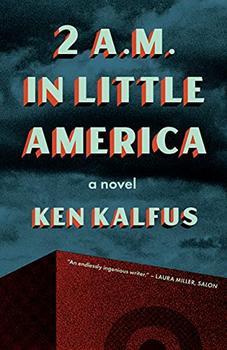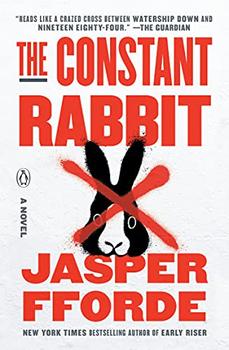Summary | Excerpt | Reviews | Beyond the book | Read-Alikes | Genres & Themes | Author Bio

Twenty-something Ron Patterson ekes out a living as a low-wage migrant worker in the unidentified country where he has fled to escape the violence of an imploding America. Haunted by memories of his past and consumed by shame and grief at his nation's downfall, Ron drifts on the margins of society in his host country—until he meets beguiling Marlise, a fellow refugee who is strangely reminiscent of a former high school classmate.
Just as he is beginning to feel rooted in his new home, anti-immigrant fervor leads to a government crackdown, and Ron's incipient romance with Marlise is cut short when he is forced to flee again, bouncing from country to country in search of a new safe haven, "each move a last-minute escape from a looming migrant center or prison."
Years later, Ron has arrived in one of the few remaining countries that will let Americans into its borders. Finding work as a repairman of security equipment, he settles into an enclave of American migrants, a squalid sprawl of makeshift dwellings in an abandoned industrial sector of the unnamed country. But political divisions imported from the conflict back home soon start to threaten the stability of "Little America," as the enclave's inhabitants dub it. And as Ron gets caught in the middle of warring factions, events take a sinister turn.
Part dystopian thriller, part political allegory, 2 A.M. in Little America is an intriguing, at times cryptic read with Kafkaesque elements that brilliantly evoke a sense of anxiety and alienation, estrangement and displacement.
In Little America, Ron encounters a strange mirror image of American life. Hamburger joints and other American-style shops line the main street. Vintage American brand names adorn the shopfronts. Yet everything is oddly off-kilter, distorted and dissonant. The signage and the furnishings are not quite right. The retail names don't fit—an auto-repair shop, for example, calls itself after a popular jeans brand, the name of a former supermarket chain now graces the shopfront of a sporting goods store. Copies of famous big box stores loom over the ramshackle tenements, but they don't actually sell anything. Instead, they stand as peculiar shrines in front of which passersby occasionally deposit bouquets of flowers.
Amid this bewildering blend of the familiar and the unfamiliar, Ron starts encountering mirages from his past wherever he goes, including a mysterious woman who may or may not be Marlise. But nothing seems to be exactly what it looks like on the surface, and the line between what is real and what is not becomes increasingly blurred—both for Ron and for the reader.
Ron's memories shift in and out of focus, facts dissolve into uncertainty, identities blur and even the city he moves through morphs into a surreal landscape of optical illusions as the glass buildings he passes cast off a dizzying array of reflections—vividly symbolizing the disorientation that ensues when the narratives we rely on to make sense of the world are disrupted and our perception of reality fractures into a multiplicity of perspectives.
Smart, darkly funny and unsettlingly prescient, 2 A.M. in Little America is a cautionary tale about the dangers of political factionalism and polarization, with all too relevant lessons about nationalism and xenophobia, the myth of American exceptionalism, and the difficulty of seeing past the distorting filter of our ideologies and group allegiances to an objective view of reality. Although Kalfus never specifies the exact nature of the political divisions that plunge his imagined future United States into civil war, the book is a clear parable for our current era of fractured politics.
![]() This review was originally published in The BookBrowse Review in June 2022, and has been updated for the
October 2022 edition.
Click here to go to this issue.
This review was originally published in The BookBrowse Review in June 2022, and has been updated for the
October 2022 edition.
Click here to go to this issue.

If you liked 2 A.M. in Little America, try these:

by Rumaan Alam
Published 2021
A magnetic novel about two families, strangers to each other, who are forced together on a long weekend gone terribly wrong.

by Jasper Fforde
Published 2021
A new stand-alone novel from the New York Times bestselling author of Early Riser and the Thursday Next series.
Your guide toexceptional books
BookBrowse seeks out and recommends the best in contemporary fiction and nonfiction—books that not only engage and entertain but also deepen our understanding of ourselves and the world around us.